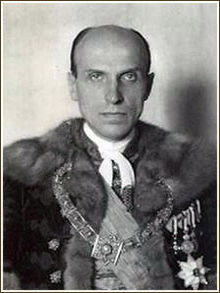Béla Imrédy
|
Vitéz Béla Imrédy de Ómoravicza |
|
|---|---|
 |
|
| Prime Minister of the Kingdom of Hungary | |
|
In office 14 May 1938 – 16 February 1939 |
|
| Monarch |
Miklós Horthy as Regent |
| Preceded by | Kálmán Darányi |
| Succeeded by | Pál Teleki |
| Personal details | |
| Born |
29 December 1891 Budapest, Kingdom of Hungary, Austria-Hungary |
| Died | 28 February 1946 (aged 54) Budapest, Second Hungarian Republic |
| Nationality | Hungarian |
| Political party | Unity Party, Party of National Unity, Party of Hungarian Life, Party of Hungarian Renewal |
| Spouse(s) | Irén Nelky |
| Profession | politician, economist |
Béla vitéz Imrédy de Ómoravicza (Hungarian: Vitéz ómoraviczai Imrédy Béla; 29 December 1891 in Budapest – 28 February 1946 in Budapest) was Prime Minister of Hungary from 1938 to 1939.
Born in Budapest to a Catholic family, Imrédy studied law as a young man before he started working for the Hungarian Ministry of Finance. Eventually becoming a skilled economist and financier, Imrédy was made Director of the Hungarian National Bank in 1928. In 1932, he was appointed Minister of Finance under the fascist Prime Minister Gyula Gömbös. After resigning in 1935, Imrédy became President of the Hungarian National Bank. Extremely ambitious, Imrédy was known to hold right wing views on matters of domestic and social policy. On matters of foreign policy, Imrédy was pro-British, a sentiment which was to help him gain the position of Minister of Economic Coordination under Prime Minister Kálmán Darányi. When Darányi resigned in May 1938, Imrédy was appointed prime minister by Regent Miklós Horthy. Imrédy’s attempts to improve Hungary’s diplomatic relations with Britain initially made him very unpopular with Germany and Italy. Imrédy realized that he could not afford to alienate the two fascist powers on a long term basis, however, and from the autumn of 1938 onward his foreign policy became increasingly pro-German and pro-Italian. Imrédy also worked to gain a base of power in Hungarian right wing politics, founding the Movement of Hungarian Life. He was quick to suppress any rivals in his quest for power, and influential fascists such as Ferenc Szálasi were harassed by Imrédy’s administration. As Imrédy drifted further to the right, he proposed that the government be reorganized along totalitarian lines and enacted legislation that restricted the freedom of the press and caused many Jews to suffer economically.
...
Wikipedia
